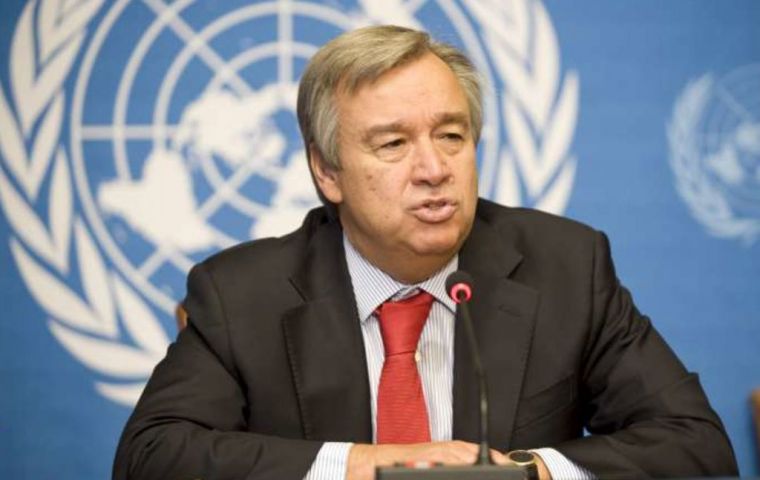MercoPress. South Atlantic News Agency
World Water Day, everyone has a role to play, Antonio Guterres
 Water is the primary medium through which we perceive the effects of climate disruption, said UN Secretary General Antonio Guterres
Water is the primary medium through which we perceive the effects of climate disruption, said UN Secretary General Antonio Guterres The world’s water resources are under unprecedented threat. Today, some 2.2 billion people lack safe drinking water and 4.2 billion people live without access to adequate sanitation. Unless we act with urgency, the impacts of climate change are projected to exacerbate these figures. By 2050, between 3.5 and 4.4 billion people will live with limited access to water, with more than 1 billion of them living in cities.
This year’s World Water Day focuses on water and climate change. With 2020 a make-or-break year for climate action, this focus is timely. Water is the primary medium through which we perceive the effects of climate disruption, from extreme weather events, such as droughts and floods, to glacial melting, saltwater intrusion and sea level rise.
Global heating and unsustainable use will create unprecedented competition for water resources, leading to the displacement of millions of people. This will negatively affect health and productivity and act as a threat multiplier for instability and conflict. The solution is clear. We must urgently scale up investments in healthy watersheds and water infrastructure, with dramatic improvements in the efficiency of water use. We must anticipate and respond to climate risks at every level of water management. We need to urgently step up efforts to strengthen resilience and adaptation for people affected by climate disruption. And, above all, we must use this year and COP26 in Glasgow to bend the emissions curve and create a secure foundation for water sustainability.
On World Water Day, everyone has a role to play. I call on all stakeholders to increase climate action and invest in robust adaptation measures for water sustainability. By limiting global heating to 1.5 degrees Celsius, the world will be in a much better position to manage and solve the water crisis that we all face.




Top Comments
Disclaimer & comment rulesCommenting for this story is now closed.
If you have a Facebook account, become a fan and comment on our Facebook Page!